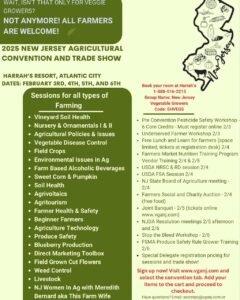There is still time to register for the 2025 Central Jersey Vegetable Growers Meeting!
February 14th, 2025
8:30 am – 2:30 pm
at the Monmouth County Agricultural Building
4000 Kozloski Road
Freehold, NJ 07728
Registration: $40 (includes morning refreshments and lunch)
For registration questions, contact Cathy VanBenschoten at 732-431-7260
or email to Catherine.VanBenschoten@co.monmouth.nj.us
NJDEP Pesticide Credits Approved
CORE – 02
PP2 – 03
1A – 03
10 – 02
Agenda
8:30 am to 9:00 am: Registration
9:00 am to 10:00 am (1 hour): Pesticide Safety for Applicators and Handlers
George Hamilton, Ph.D. – Specialist in Pest Management, Rutgers, NJAES, RCE
Safe and effective use of pesticides is essential for controlling pests of vegetables, while protecting human health and the environment. This presentation will focus on the proper storage and use of pesticides and the requirements for training and record keeping applicable to commercial vegetable growers. Dr. Hamilton is an extension specialist and chair of the department of entomology at Rutgers University. He has been involved with the initial certification and recertification of New Jersey’s pesticide applicators since 1986.
10:00 am to 11:00 am (1 hour): Updates on Vegetable Disease Control
Andy Wyenandt, Ph.D. – Specialist in Vegetable Pathology, Rutgers, NJAES
Crop losses due to vegetable diseases impact commercial growers every season. As new research findings emerge, our controls are becoming more efficient and effective for addressing these persistent challenges. This presentation fill focus on updates for controlling important diseases in vegetable production as well as new information in the 2023-2024 Commercial Vegetable Production Recommendations.
11:00 am to 11:15 am (15 minutes): BREAK
11:15 am to 11:45 am (30 minutes): Updates from the Vegetable IPM Program (Pre-recorded presentation)
Amanda Quadrel – Senior IPM Program Coordinator, Rutgers NJAES
Managing insect pests continues to be a major problem for commercial vegetable growers in New Jersey. This talk will discuss important updates to the Rutgers Vegetable IPM program, such as new personnel, new trapping protocols, techniques or products to consider for the upcoming season, and updates on pests and pesticide resistance.
11:45 – 12:15 (30 minutes): Industry and Service Provider Updates
12:15 pm to 1:00 pm (45 minutes): LUNCH
1:00 – 1:30 pm (30 minutes): Food Safety Update for NJ Farms
Meredith Melendez – County Agent, Mercer, Rutgers NJAES, RCE
This talk will provide an Update of the FSMA Produce Safety Rule agricultural water regulations for the 2025 growing season, clarification on NJ Cottage Food Law ingredient allowances, and how gleaning activities can impact your FSMA PSR inspection.
1:30 pm to 2:00 pm (30 minutes): Laser Scarecrows for Bird Damage Control
Kate Brown – County Agent, Somerset, Rutgers NJAES, RCE
This presentation will introduce growers to lasers, how they work, and their role in the bird damage control toolbox. The primary goals of this presentation are to describe results from local and regional efficacy trials, highlight laser safety practices, and provide an overview of how lasers are currently being utilized on four NJ farms.
2:00 pm to 2:30 pm (30 minutes): Beginner Farmer Program Update
Bill Hlubik – County Agent, Middlesex, Rutgers NJAES, RCE
Matt Milburn – Program Associate, Middlesex, RCE
This presentation will provide an update on the Rutgers RU Ready to Farm Beginner Farmer Training Program and ask the group for input on practical applied research and programs the farmers would like to see in 2025 and beyond.
This Annual Event is brought to you by Rutgers Cooperative Extension

